#absolve themselves of creating solutions
Explore tagged Tumblr posts
Note
I’m wondering something though -
When Xie Lian and the others learned of He Xuan’s background, it was made clear He Xuan had extremely bad luck.
“Although this scholar He’s family was very, very poor, he was a talented man. Since his youth, he was frighteningly intelligent and picked things up quickly and expertly. He was also widely known as a good son; there was really nothing bad to say about the guy in any respect. Unfortunately for him, he was also very unlucky. For him, nothing good ever lasted.”
Volume 4, Chapter 53 page 28
———
If the Reverend of Empty words can only shout misfortune upon its victims (and their loved ones) causing them to despair so much they commit suicide, does this mean He Xuan had bad luck all on his own even without the fate switching? 🤔
Or does the Reverend actually draw bad luck to his victims? This would actually make a lot sense but from how Xie lian explains things , this isn’t how a usual venerable works and explanations about the Reverend do not explicitly state this. 🤔🤔🤔
He Xuan couldn’t have had bad luck all on his own without the fate-switching, because his fate was to ascend. However, I think a full answer to this question would need to be a meta, cause I think that a core point of tgcf is that fates are not set-in-stone from birth, that fortune is what you make of it rather than what makes you, and that we shouldn’t fall into traps of letting superstition rule our lives, thoughts, and morality. The Reverend of Empty Words specifically chose prey amongst those with great fates, and most of those people had terrible ends. The Reverend was only able to speak on Shi Qingxuan—who had a fate of wealth—once before his family masked his presence, and yet the family still went into decline and lost their fortune. Were all of those fates fake? Was Guoshi not as good a fortune-teller as he so claimed? Or is all of this more changeable than people want to believe?
#tgcf asks#silver-cyn#good job at finding the ‘a whole other topic’#that i was tryna avoid getting into on that other post lmao#anyways it’s easier to blame some outside source for your misfortunes#than to look into yourself and wonder if something you did might have caused it#or find that *nothing* you could have done would have stopped it#and you would have experienced that misfortune regardless of ‘fate’ or ‘action’#but i think finding an outside scapegoat also allows people to#absolve themselves of creating solutions#‘if i have a bad fate why should i try to live better?’ type logic#anyways i maintain that neither reverend nor venerables can create curses#they’re just good at mind games#and if that’s all it takes to reverse someone’s fortune… 😬
17 notes
·
View notes
Text
Okay have ramblings on Princess Bee but with the Sentikids plot. Because I /am/ keeping that somewhere in it.
Okay so. I do /in theory/ like the Sentikids plot and this is going to be part of a rewritten AU where that makes more sense. Things like Adrien /was/ rebellious but as Gabe got worse he tugged on the leash and Adrien was confused why it was so hard to go against his father and his friends were confused he wasn't sneaking out anymore and so on and so forth.
Anyway. Lore stuff first.
The Peacock does not make Sapient Beings by default. Trying to do so fucks things up and takes a part of the user's Life Energy and puts strain on the Miraculous itself.
The Tsurugis and Agrestes had some business deals, talked of their inability to make children, and looked into ways to fix that. They eventually found legend of an artifact that could create life. Tomoe hired Nathalie, a fantastic treasure hunter, to track it down. And she does, handing it over to the Tsurugis.
Kagami was made first, her father being the one to use the Peacock. It hurt him, a lot, but he did not realize the severity of his injuries before he handed it over to the Agrestes, where Emilie made Adrien.
Both Emilie and Mr. Tsurugi were succumbing to their injuries. They and their partners were frantic to find something to fix them. Gabriel tricked Colt into helping them, giving him the Peacock to make Felix without telling him of the pesky little side effects. In for a penny in for a pound, Colt was now using his resources to help fund this expedition.
Between the three of them one after the other, the strain on the Peacock shattered it. Now a danger to all who tried to use it.
While they managed to find ways to delay the inevitable, Mr. Tsurugi quickly succumbed. Whether it was because he was the first or just because his body was resistant to their solution, it's unknown.
Colt and Emilie were able to prolong their deaths for another decade, but eventually succumbed. Difference there is that while Gabe preserved Emilie on the brink of Death, Amelie was fine with letting Colt die. (Also she might be a touch in the dark on all this. Felix knows more than she does because Colt would rant when abusing him).
Yadda yadda Gabe going Hawkmoth.
I am changing like. I want at least one of these parents to be decent damn it so I'm letting Tomoe stay as good-ish. Not fully absolved but she does love Kagami. She gave the child her own Amok, and though never talking much about her late husband she didn't blame the girl for his death. A lot of her working with Gabe was either 'if he revives Emilie he'll revive the other two as well' and 'Gabe has the Peacock and can therefore snap Kagami out of existence if Tomoe doesn't comply'.
Post-defeating Gabriel, the Sentikids do find some way to sever the connection to their Amoks. Merging the Magic into themselves and making it so they can no longer be ordered by the Amok or hurt when its damaged.
Though Mr. Tsurugi and Colt can't be brought back from the dead, Emilie is in her cryo-chamber and the gang does manage to find a way to fix her.
22 notes
·
View notes
Text
No, Sasuke Did A Lot Wrong
(Disclaimer: There's nothing wrong with liking Sasuke as a character or sympathizing with his backstory. I'm also not talking about all Sasuke fans, only the extreme "pro-sasuke/anti-konoha/anti-itachi" fans.)
I'm getting pretty sick of the defenses used by Sasuke fans to justify his behavior throughout shippuden. The defenses themselves are fine enough, Sasuke did have plenty of reasons for his anger and resulting actions, but his fans always seem to be trying to absolve him of blame. The worst of them even act as if you're some morally reprehensible monster if you dare say Sasuke made a lot of terrible decisions that hurt a lot of people. God help the poor soul who dares to like Itachi or Tobirama.
I'm not going to defend Konoha or their actions here and, from what I can tell, no one else is. The entire shinobi world is fucked up in a frustratingly realistic way, so it makes sense that anyone trying to do something to fix it would immediately earn audience sympathy and relatability. However, most of those characters are villains. Why? It's not because the Naruto series is pro-violence, authoritarianism, war, or complacency. It's because they're terrorists. They react to personal wrongdoing, sometimes perceived but often not, by creating violent plans that are undeniably extremist. Madara and Obito basically wanted to hard reset the world by placing everyone into an eternal genjutsu and Nagato wanted to nuke the planet every time a country asked for war until all conflict disappeared. Those are objectively bad plans that would put the world into an even worse state and I hope I don't have to explain why.
Sasuke's "revolution" was no better. As a quick reminder, these were Sasuke's plans to "fix" the shinobi world: first he wanted to destroy Konoha, then he wanted to become a tyrant over Konoha, and lastly he wanted to act as a threat so dangerous that the world was forced into cooperation to fight him off. Not one of these plans is good. All of them would catch many innocent lives in the crossfire and none of them would build a better world. The best argument to defend Sasuke's goals is "complacency to wrongdoing makes you just as guilty as the wrongdoer." Ignoring that that argument is flawed, especially in the context it would theoretically be used, that argument still wouldn't change the fact that his methods are violent and extremist.
What makes all of this worse is that Sasuke's goals are also extremely hypocritical. Tell me if this sounds familiar: to prevent future conflict, one Uchiha erases a group of people because select members of that group were a potential risk. That Uchiha, in this process, agrees to take on all responsibility for this action and all anger resulting from the fallout. Was I talking about Sasuke's initial goal to change Konoha? No, I was talking about the Uchiha Massacre. His goal to become a feared tyrant over Konoha to reform it into a more peaceful state according to his image bears a striking resemblance to Danzo Shimura, of all people. His final plan is the only one that can be considered uniquely his, but if you simplify it to its core(an individual taking the burden of all of the world's hatred onto their shoulders), then it mirrors the intention of Madara(and sort of Obito, but mostly Madara). Sasuke is repeating history by mimicking the solution that he's already experienced being in the crossfire of, the goals of a monster he scorned for his morals, and the plan he personally watched fall to pieces.
Of course, this is a post about Sasuke's actions, not the plans he never enacted. The most he could be punished for is conspiracy. So, let's talk about what he did. I'd say for all of part 1 and the start of shippuden, Sasuke's worst offense is being a bit of a snarky jackass. He wasn't cruel, he had a set of morals that he consistently held himself and others to, and he deeply cared for his friends and allies. His interactions with Itachi were upsetting, Orochimaru manipulating him was tragic, and his struggle to decide between his friends and revenge was interesting. The most morally skewed thing he did was his fight with Naruto, but even that was forgivable. The start of shippuden maintains him being mostly in the clear: he nearly kills team Yamato, he kills Orochimaru, he starts traveling with some morally questionable people(scaring the crap out of some civilians and stealing a sword in the process), and he fights and kills Itachi. Again, he's not exactly a stand up citizen, but he remains just and easily forgivable. The Five Kage Summit arc is where this changes.
After learning the truth about the Uchiha Massacre and Itachi's true role in it from Obito, the Five Kage Summit arc begins with Sasuke joining the Akatsuki(a.k.a technically a mercenary group, but better called a terrorist organization considering their, at this point known, goals). The arc is easily a shift in the story's direction(for better or worse), meaning a shift in the main characters, and easily an arc I'm going to discuss in more depth in the future. Sasuke's character shift is revealed to be downward when he and the rest of team Taka attack and "kill" Killer Bee. I don't care how much you like Sasuke or how much you agree with his anger, you cannot justify him attacking and attempting to murder someone who has done nothing but be a jinchuuriki. Soon after Sasuke's role in the attack is revealed, Karui, Omoi, and Samui leave to Konoha to tell the Hokage about the planned five kage summit and that Kumogakure is taking the responsibility of Sasuke's punishment out of Konoha's hands. This is the arc where Sasuke undeniably becomes a criminal and his crimes have victims. Say what you want about Konoha and complacency and injustice, but let's make some things clear.
Killer Bee had nothing to do with the Uchiha Massacre.
Kumogakure had nothing to do with the injustices Sasuke was fighting against.
The samurai of the Land of Iron had nothing to do with shinobi affairs.
Team Taka didn't deserve to be betrayed for being "too weak."
I didn't make this post to complain about Sasuke or make him out to be a bad character. Actually, I think he's one of the best written within the series and he's among my favorites. Sasuke is a morally complex character, a fantastic foil to Naruto, an impactful warning on what happens when someone is consumed by hatred and abandons their humanity in pursuit of their goals, and the end of his arc was really nice(until Boruto ruined it, but that's another rant for another day). I get so upset about people making Sasuke out to be an innocent or wholly justified character, not only because those same people often take an undeserved moral high ground and talk down to/shame people for having problematic favorites as if Sasuke isn't problematic, but because it doesn't give his character the credit it deserves. Sasuke is such a good character because he and his actions are imperfect. He's good because he is morally complex.
The Naruto series is about a boy who is ostracized by his home and targeted by a terrorist organization for something he has no control over. He responds to his circumstances by building connections, finding peace, and making an attempt to change both himself and the world around him rather than giving into his anger and lashing out. Naruto and many other characters struggle to maintain their humanity in a world that seeks to destroy it. Sasuke's story is not one of a tragic hero burning his perpetrators and the world that allowed them to the ground. His story is about a hurt and manipulated child abandoning more and more of his humanity under the assumption that it'll somehow help him do good in a bad world until he becomes the bad. His story ends with him confronting that humanity and coming to terms with it because there was still someone waiting for him with a hand held out.
#Anti Sasuke fandom#Anti Sasuke Uchiha fandom#I don't want to tag this anti-sasuke so...#Sasuke Uchiha#Naruto#Naruto Shippuden#I don't really care if you love or hate Sasuke#but don't condescend or harass people for having an opinion#Naruto is a shounen action series about hope stop trying to make it into a grimdark#I don't know how cohesive or readable this is since I didn't write it all in one go like my other posts#Rant#Analysis#Character analysis#sort of#kind of#my stooff
21 notes
·
View notes
Text
misc thoughts while the game recompiles shaders.
it should be noted that while pirith is ruthless and relentless, he does what he does in pursuit of the only solution he can see. people characterize him as an uncaring tyrant but nothing could be further from the truth - he is simply holding a losing hand, knowing that the moment he concedes it will create a power vacuum and he fears what will rise within it.
in truth, he feels as though he has no choice. that he was raised to the position of inquisitor not due to any inherent leadership skills, but due to the fact that they wanted someone else to make the hard choices for them. he was a symbol they could use to absolve themselves of the guilt that comes with hard choices.
everything he learns in the hunt for solas is another knife in the back. the best he can do is reject and reframe it all, determining that the dalish may not be worshipping true gods but that doesn't negate the culture and traditions they have built. while he may once have been open to solas' version of the truth, he is keenly aware that abandoning the elves after sealing the gods and the fade was what damned them to this existence. and thus he refuses to disband the inquisition and works from within the world humans built, channeling the legend of the dread wolf he grew up on rather than the man who actually bore that mantle.
pirith is called a tyrant not because he wields his power irresposibly, but because his power is crushing and absolute. there is no way to act that will not cause death, and no room for doubt when every action is going to lead to someone dying. he lives in a numbers game, trying to game a broken system while seeking for ways to dismantle it.
cold and callous as his reputation is, he cares for the little people, the ones who get stepped on by the titans vying for power they don't need. he has done what he can to use his power for good, but it's an ouroboros. the only reason it hasn't devoured itself is because he's the stick wedged between its jaws, forcing it not to bite down.
but eventually he will snap and be consumed by it.
and he welcomes that day.
0 notes
Text
Plato, Lamentations, and Suffering.
Plato’s Allegory of the Cave and Lamentation’s Great is your Faithfulness both posit that the way to avoid suffering is through making changes to yourself in order to alleviate distress. Suffering is defined by the author of each work as ignorance. The only way to reach a state of happiness therefore is to educate yourself on your deficiencies so you may correct them. The reason these texts are so similar is that they both are trying to answer the same problem of trying to explain pain, its causes, and its remedies.
Both texts talk about self-improvement and education as the means to better oneself and one’s situation in order to escape suffering. These texts present two variations on the theme of changing one’s behavior or the way one thinksto change a bad situation. In Lamentations, one’s suffering is caused by displeasing God or sinning in some way. To stop one’s suffering, one only needs to find what they are doing that is displeasing God and change it. As the author of Lamentations puts it, “Why should a living man complain, a man, about the punishment of his sins?” (Lam. 3.39). In the Allegory of the Cave, one needs an enlightened teacher to show them how to step out of the cave and into the light of understanding the perfect forms of concepts such as goodness rather than their shadows or misunderstood versions. However, enlightenment does not absolve one from responsibility: “[The enlightened] must be made to descend again among the prisoners of the cave, and partake of their labors and honors” (Plato 203, para. 57); the enlightened person becomes a teacher for someone else stuck in the cave. These are both examples of someone changing something about themselves to change their environment.
If education and self-improvement – knowledge – changes suffering, then it isn’t a stretch to say that these texts define suffering as ignorance. If the texts agree that knowledge creates bliss, the opposite of knowledge must create the opposite state. So therefore ignorance, the opposite of knowledge, creates suffering, the opposite of bliss. Through education, then, people can discover enough to change the nature of their situations and rise up from their distress. Such enlightenment can be achieved from, in the case of the Allegory of the Cave, the help of a teacher, or, in the case of Lamentations, the word of God.
The idea that you can have control over your life if you change yourself gives a person a sense of power over their life that they did not feel before, and makes them feel they have control over their situation. Feeling trapped in a stressful place in one’s life can be terrible, and believing that you can do nothing to change it can be soul-crushing. The little sliver of hope offered by these texts that that they actually can do something to remedy their situation gives people a little sense of that power that everyone craves. This thought process is the backbone of these philosophies: the ability to help oneself.
Similar modes of thought are an attempt to take back power in a situation where one has none. Philosophy is practiced to try and understand life and the world better: philosophy tries to use human reasoning to find an explanation, a reason and a solution to life’s problems. Religion does the same thing, but leans on supernatural forces instead of or in conjunction with human reason; religion cleanly presents an explanation, a reason and a solution: here’s what’s wrong, here’s why it’s wrong, here’s how you can fix it. The Lamentations author does not replace human reasoning with a divine entity or supernatural force, but rather has them rely on each other: one has to use human reasoning to determine how to act in accord with the supernatural. In Lamentations, what’s wrong is that God is upset. It’s wrong because you are God’s child, and he wants what’s best for you: “…but, though he cause grief, he will have compassion according to his steadfast love…” (Lam. 2.32) You can fix your bad situation by assessing yourself and figuring out what sins you have committed. After all, according to the author of Lamentations, God does not punish innocent people: “To crush underfoot all the prisoners of the earth, … to subvert a man in his lawsuit, the Lord does not approve” (4.34-36). In Plato’s Allegory of the Cave, what’s wrong is that you are unenlightened. It’s wrong because you are not experiencing the true nature of what life has to offer. “To them, I said, the truth would be literally nothing but the shadows of the [true forms of concepts]” (Plato 199, para. 13). You can fix your suffering by finding an enlightened teacher that will show you the true ways of the world. Plato describes such teachers, or “guardians,” as “the men… wisest about affairs of state… who [have] a better life than that of politics.” (Plato 205, para. 71)
Lamentations and the Allegory of the Cave both share this philosophical principle: that the explanation of one’s suffering is ignorance, that the reason ignorance causes suffering is that you are not understanding or comprehending fully the steps you need to take in order to improve your life, and that the solution therefore is to educate yourself or be educated on your misdoings or misunderstandings and take steps to correct them. Assuming both of these texts’authors follow their own advice, it is safe to say that the author of Lamentations would suffer more than Plato. Lamentations’ philosophy preaches taking responsibility and waiting for a situation to improve; for some, it is empowering and helpful to think that they have control, but this approach can also cause people to blame themselves for problems they did not cause. The line “[i]t is good that one should wait quietly for the salvation of the LORD” (Lam. 3.26)encourages people to stay in the situation that is causing them harm and wait for God to help them instead. This can lead to people blaming themselves for their misfortune, and not trying to leave a harmful situation that is the actual cause of their stress. Plato’s philosophy is also about taking responsibility, but it’s much less accusatory, as the people stuck in the cave are chained in place and in need of help rather than actively doing something wrong. In fact, it’s the enlightened person’s moral duty to return to the cave and show everyone else what they have learned: “[The enlightened] must be made to descend again among the prisoners of the cave, and partake of their labors and honors” (Plato 203, para. 57).This absolves the unenlightened of blame, as they are only doing what comes naturally to them, and it is up to the highly educated to help them.
One obvious issue with Plato’s solution to the problem of suffering is that, if suffering can only be lifted with the help of an enlightened teacher, how can this chain of teachers and students begin? How does the first teacher achieve enlightenment? And if no teacher appears to you, are you powerless to achieve enlightenment on your own? If so, then Lamentations must offer a more practical prescription for ending suffering: the supernatural has already intervened to give humanity the tools to achieve a good enough understanding to cure them of suffering. In effect, God is Plato’s first teacher. As Plato acknowledges, it must be possible for a person to achieve enlightenment through their own introspection, or as he puts it, “the power and capacity of learning exists in the soul already” otherwise there would never be a first teacher (Plato 202, para. 45). Therefore, according to Plato, while it is easier to achieve enlightenment with the help of a teacher, bettering one’s understanding must be possible on one’s own as well. Therefore, Plato’s prescription gives suffering people the tools to improve their situations without the unhelpful guilt of having displeased God created by the Lamentations author.
In the end, both texts are about ways people can improve themselves in order to improve their current situations. One can improve themself by learning the cause of their suffering in order to change their suffering or prevent it. The reason why these texts are so similar in subject matter, theme and prescription is that they both address a common problem that people want to solve: why suffering had come their way. While the texts have many similarities, the Lamentations author probably suffers more since that author’s approach adds a layer of guilt that Plato avoids.
Works Cited
Plato. “The Allegory of the Cave.” Wake Tech English 111 Reader, edited by Wade Vickrey, et al, Hayden-McNeal, 2020, pp. 198-205. Lamentations. “Great is your Faithfulness.” The Bible. English Standard Version.
0 notes
Note
About the whole Mardoll situation, I feel it's similar to the Creepshow art incident, which was another person who had previously led harassment campaigns who was then outed by kiwifarms and run off the internet. Do I think this prevents future victims without those people around to terrorize and dog pile people? Yes. But am I okay with kiwifarms initiating vigilante justice? No. Especially since it does nothing to solve the root cause of the situation, which is not these figureheads themselves, but the masses that are willing to jump in on the harassment campaigns they lead. Yes, they start them, but every person who participates is culpable. And no matter how many of these people you run off the internet, another will rise to take their place. All this has done is create a power vacuum for someone with slightly different takes but an identical end goal to harass and bully people to get a platform. This sense of justice, of having gotten rid of someone bad, is only an illusion. It's like any other sort of punitive or capital punishment. We think if we can punish bad people we can make society a safer place, but unless we address the root causes that create and facilitate this sort of behavior, it will never end. I don't really have a solution, only a sense of emptiness.
--
The only people who can solve this are the masses who follow these idiots.
Have some actual moral fiber, people. Delegating to a charismatic leader just makes you one of the idiots with pitchforks. It absolves you of nothing.
37 notes
·
View notes
Text
THE BOX IS NABOO
That’s it, I’m doing it, I’m writing that stupid meta I’ve had in the works for two and a half years, I’m sharing it with the world. I promised it for last Thursday, my poll was forever ago, but whatever! I’m writing that freaking thing.
(super duper long post, press j to skip)
Enter my rabbit hole.
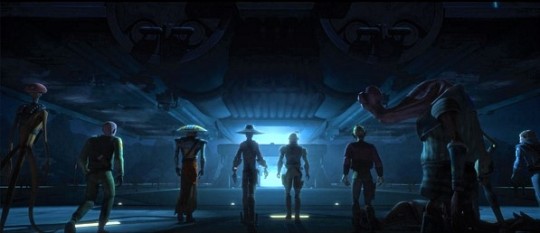
First thing to establish: the Box makes no sense whatsoever in-universe.
((EDIT: Something I forgot to mention. IRL, the premise of a giant murder cube and the aesthetic - wall patterns, light designs, etc - of the episode come from the 1997 horror movie Cube, (see the episode’s wookieepedia page). However, while the two are very closely linked visually, the Box does not follow the movie structurally or narratively, as you can verify by simply reading the movie’s summary.))
Recap of the context for the "Box" episode (s4e17): Palpatine is planning his own kidnapping. It was never meant to succeed, and while the plan would obviously benefit him (making the Jedi look bad, pushing Anakin closer to the Dark Side, making Republic citizens more afraid -> more docile, etc...) his actual goal is never explained, and it’s weird that he’d go to such extreme lengths for results so minimal that we’re never told what they are.
So Palpatine asks Dooku to kidnap him at the Festival of Lights on Naboo. Dooku hires Moralo Eval to design a giant box-thingy to test bounty hunters to hire the best of them to kidnap Palpatine. Moralo then gets arrested to alert the Republic that something is afoot, and hires Cad Bane to break him out. Obi-Wan - undercover to learn Moralo’s plan - goes with them. They evade capture and go to Serenno, and Bane and Obi-Wan have to pass the box-thingy test. The level of brainkarked logic here... Truly on par with Megamind, Gru and Heinz Doofenshmirtz.
Setting aside the insane plot holes and utterly nonsensical behavior of the villains, the Box itself is moronic from a plot perspective. It’s insanely complex, obviously incredibly expensive and would have taken months (more like years but it’s a short war) to make when it’s not even needed for the dastardly plot! Just hire some guys who have already proven themselves against Jedi! Throw cash at Bane and Embo and a few others! Maybe attack them with your saber and see how they do!
And after all that, Dooku still ends up trying to kidnap Palpatine on his own. I can’t even...
So why does the Box exist? Well, apart from being a nerdy callback to Cube, giving us a good thrill and being generally awesome to look at, it has actual narrative purpose within the SW universe.
The box is Naboo.
What the Box lacks in plot relevance, it makes up for with its heavily symbolic meaning. It very closely follows Obi-Wan and Qui-Gon’s experiences on Naboo - but only certain parts, which I’ll explain later.
We start with clean, sterile environments, SW’s favored way of showing villainy.


Then we have the protagonists locked in a room as dioxis, a poison gas, pours in.
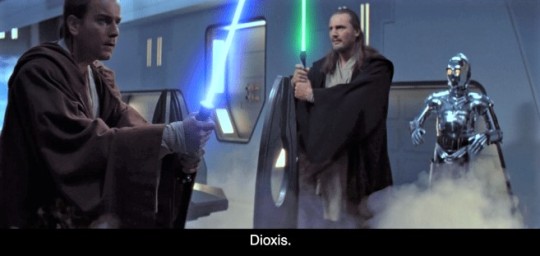
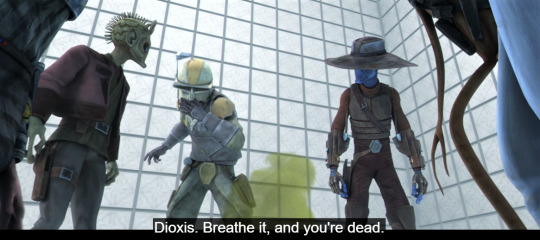
And then they escape... this way.
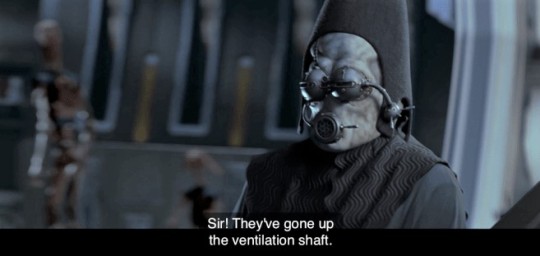

(Okay, here the shaft is down, not up. And it’s not a ventilation shaft per say, it’s the designed escape route. Same difference).
We then skip most of TPM (namely, Obi-Wan and Qui-Gon discovering the droid army, finding Padmé, leaving Naboo, landing on Tatooine, going to Coruscant, etc, etc) to come back to Naboo and go directly to the lightsabers and catwalks.
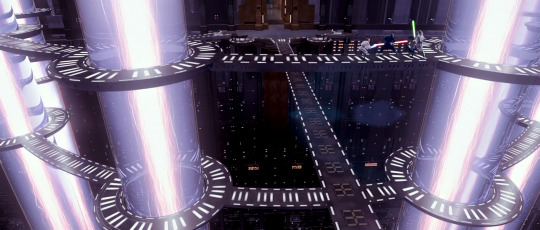

(Note: in both scenes, Obi-Wan has to propel himself from a catwalk.)
In TPM and TCW, the catwalks are immediately followed by ray shields

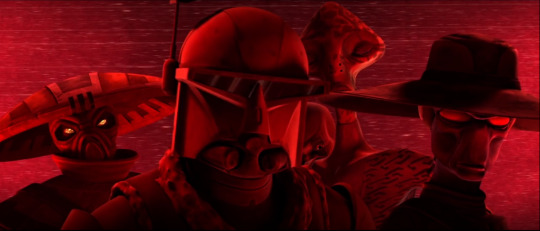
And we finally end with the last scenes. Now, they don’t look the same but they are structurally identical.
Obi-Wan is faced with a challenge unsuited for his abilities (facing Darth Maul // shooting three moving targets when he’s far more skilled with a blade than a blaster) on a narrow space above a melting pit/pit of fire.
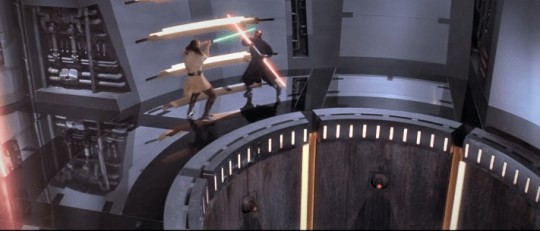
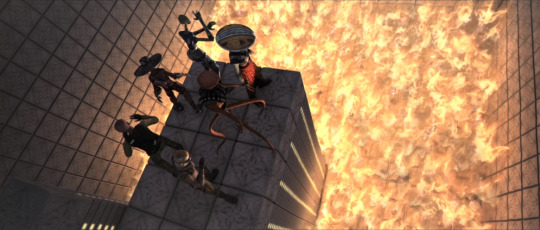
He first watches someone die failing to complete the task...

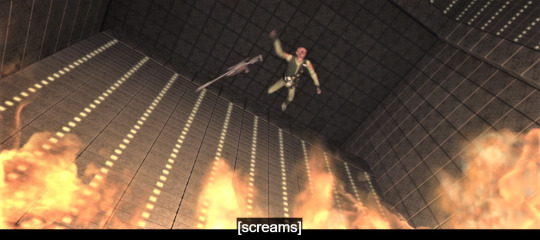
... and has to do it himself, faring much better than expected (holding his own against Maul // shooting all the targets easily).
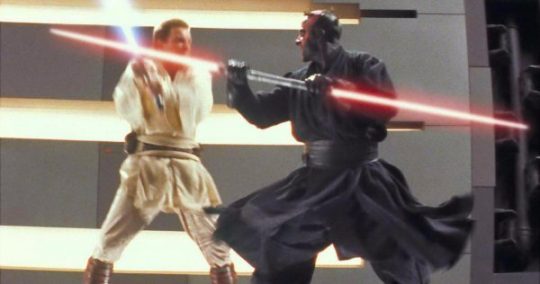
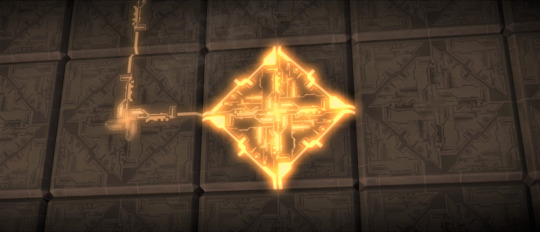
He then almost falls to his death and gets saved unexpectedly.
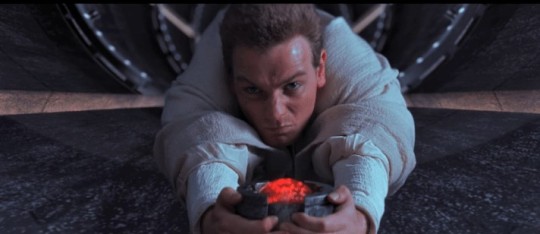
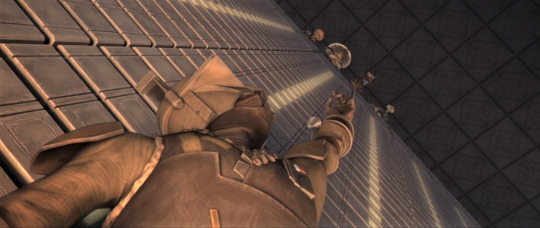
And then there’s the final showdown.

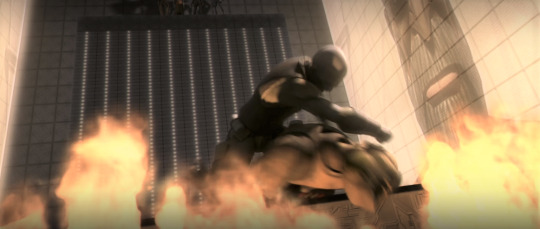
In both scenes, Obi-Wan is angry. And in TCW Dooku eggs him on, banking on his anger. (More on that later.) In both cases though, he centers himself and is able to overcome both his opponent and his own unbalance. But in TCW, he doesn’t go for the kill, because he doesn’t need to.
The Box, as a literal character-explorator ex-machina, thus shows us Obi-Wan’s growth.
In TPM, Obi-Wan follows Qui-Gon’s lead. In TCW, he is the leader. He identifies the gas, makes the plans. He doesn’t fall from catwalks anymore - he runs atop moving ones. He doesn’t stay stuck behind ray-shields, he finds the solution. (Btw, how did Moralo know what blood type Derrown the Exterminator was? There was a 50% chance of him dying - thus killing all of the bounty hunters. Was that an acceptable outcome? TCW I need answers!) He doesn’t slay his foes, because he’s become powerful enough, skilled enough and wise enough to survive (and win) without needing to kill.
He’s grown - and, even more interestingly, he’s also stayed the same. In the previous episodes, we see some of the dark aspects of Obi-Wan. How he - like all Force-wielders, all people - could lose himself if he stopped maintaining absolute control.

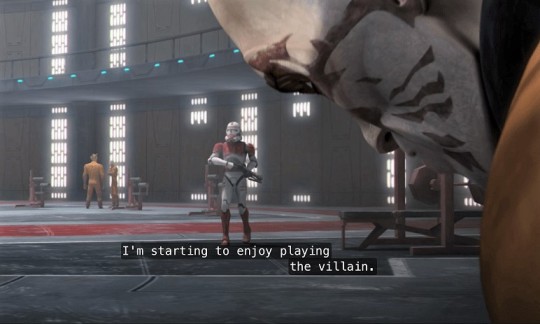

But in the Box, surrounded by the worst criminals of the Galaxy, the most ruthless, worthless people, he’s still kind and tries his best to keep them alive.


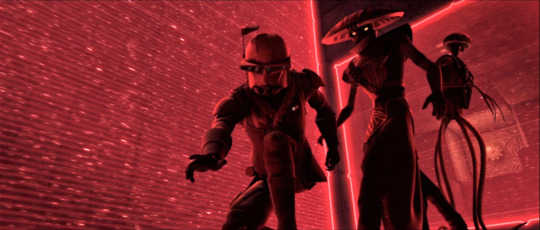
The Box is a reminder and a reassurance for the audience that Obi-Wan Kenobi is still there under Rako’s face. He hasn’t lost his compassion, his restrain. He’s still a Jedi. And he’s an awesome, badass one.
And now, for what it tells us about Dooku!
It’s much shorter, don’t worry. Basically, Dooku considers that the best way to pick “the best of the best” of the deadliest people in the Galaxy is making them go through what killed his Padawan. There, I’ve broken your hearts, you’re welcome.
More seriously, Dooku is a manipulative ass. It’s pretty clear that he knows Rako is Obi-Wan, or at the very least suspects it.
He has an interesting reaction upon learning Rako’s identity, he keeps praising him despite his usual distaste for low-lifes, he smirks secretively after Eval says “I’ll show you who’s weak” (not included there because it’s a close-up of Dooku’s lips and no one wants to see that) and he tells Rako he’s very disappointed when he doesn’t finish off Eval.
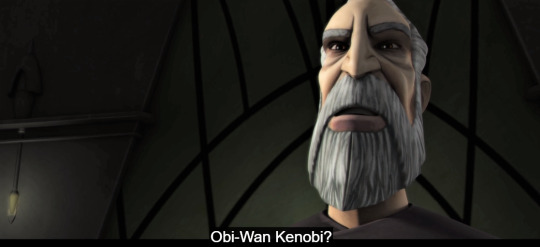
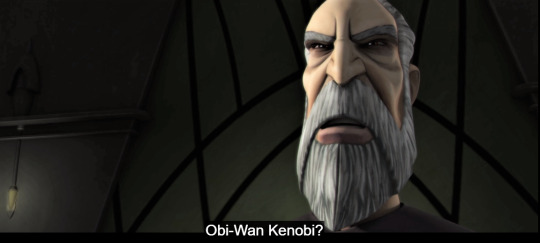
[Later]
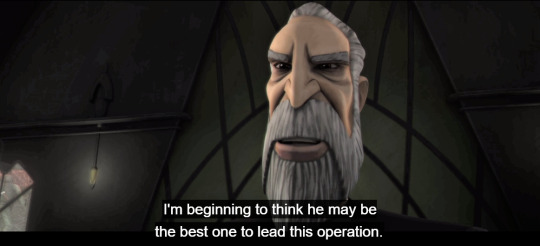
(Look at this smug asshole - I can’t. YOUR GRANDSON IS THE BEST, WE KNOW, STOP ACTIVELY RUINING HIS LIFE ALREADY.)
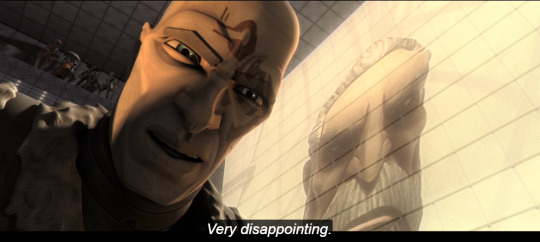
(Dooku... why...)
Now obviously Dooku couldn’t have made the Box specifically for Obi-Wan, because it would have to have been designed months before the Council ever decided to send Obi-Wan undercover, but he has no qualms trying to use it to push Obi-Wan to the Dark Side. Ffs Dooku, making your spiritual grandson relive one of the most traumatic events of his life on the off chance that he’ll join you (and desecrate his Master’s memory in doing so) is not okay!
Final tidbits of analysis: I mentioned that not all of TPM is mirrored in the Box. What’s omitted is the droids (even though Obi-Wan and Qui-Gon fight B1′s and droidekas between the dioxis and the ventilation shafts) and anything pertaining to Sidious (all the political stuff on Coruscant). You’ll also note that the fake lightsabers are orange.
=> The Box distances itself from anything that connects Dooku to Naboo. Red lightsabers are the trademark of the Sith, so they’re not used. The bounty hunters will be facing Jedi, so logically the fake sabers should be green or blue - and yet they’re orange, the color closest to red without being red. It fits with Dooku’s special brand of dishonesty - he always tells bits of the real story but twists them just enough to absolve himself of any fault and to justify his choices.
(”We can destroy the Sith” -> could maybe destroy Sidious with Obi-Wan, but fails to mention he’s a Sith Lord himself; “the Viceroy came to me for help, that’s why I’m attacking the Republic” -> political idealism is a small part of it, but fails to mention he’s Sidious’ underling and is playing the Viceroy like a fiddle; “Qui-Gon would have joined me” -> maybe, still fails to mention he’s working for the man who ordered Qui-Gon’s death; “I told you everything you needed to know” -> debatable, never said that Palps was Sidious; “Sifo-Dyas understood, that’s why he helped me” -> partly true, doesn’t admit to killing Sifo-Dyas right after getting his help)
So we have a twisted version of Naboo, droid-free (as droids are now irrevocably associated with Dooku, even if that wasn’t the case in TPM) and with sabers that aren’t quite red. Keep in mind that Dooku had already fallen by TPM. (We know this because he killed Sifo-Dyas and created the Clone Army - part of Sidious’ plan - when Valorum was still Chancellor, as per the episode The Lost One.) That means Dooku was (in)directly complicit in Qui-Gon’s death. And the Box doesn’t (=refuses to?) acknowledge that.
(Also omitted in the Box are the Gungans and Tatooine. It makes sense, because Dooku probably wouldn’t have the full details regarding those parts of Qui-Gon and Obi-Wan’s missio as they weren’t as public, and would see them as irrelevant if he did. He utterly despises Anakin, and Gungans are the type of people he always dismisses out of hand).
Anyway, that’s my two cents about the Box. To quote Lucas...
“It’s like poetry. It rhymes.”
Thanks to @lethebantroubadour @impossiblybluebox @nonbinarywithaknife @ytoz and @kaitie85386 for voting for this one. Next up is a compilation of the Jedi being casually tactile with each other (because they’re a warm and affectionate culture, dammit).
Also thanks to @laciefuyu for giving me gifs I ended up not using ^^; you rock anyway!
#meta#my meta#the box#deception arc#rako hardeen#rako hardeen arc#naboo#obi-wan kenobi#count dooku#cad bane#moralo eval#darth sidious
1K notes
·
View notes
Text
“I had carried around a rather musty, fussy, and completely uninformed image of what a girls’ school must be: the sort of place where a child of privilege learned how to crook her little finger while she drank tea. I had thought that girls’ school was for girls who could not handle the real world– until I spent time at two of them. The girls I met seemed almost arrogant at first, but I soon realized my mistake. They were not arrogant; they were self-confident, comfortable with themselves in a way I was not used to seeing. They had learned to speak, as one Marlborough teacher put it, in ‘a person’s voice, not a woman’s voice.’ They said what they meant, absolved of the social concerns that often made girls tone themselves down. They felt no need to defer or compromise their opinions in the name of getting along.”
— Karen Stabiner. 2002
Okay so, let me start by saying I have complicated feelings on this and I don’t necessarily support gender segregated education, especially obligatory gender segregated education. Mostly I think it’s putting a band aid on a bullet hole and in the long term would create more problems than it solves because if boys never interact with little girls it further “others” girls and I think only keeping boys together with no interaction with girls creates a breeding ground for toxic masculinity. By that I mean the men I know who are genuinely gentle, kind, soft, genuinely respectful to women, and know better than to express themselves and solve problems through violence and aggression are men who primarily grew up around girls instead of other boys, because boys who come from traditional conservative “boys will be boys” homes are a major driving force in pushing other boys to adhere to toxic masculinity. So for many boys getting to grow up around girls as their friends and playmates could be their saving grace. Plus of course there’s also the obvious issues gender segregated, especially obligatory gender segregated schools cause for trans kids.
However, that being said, I thought this was an interesting excerpt because I’ve met girls and women who went to all girls schools, and I had a similar experience. They came across as louder, more confident, and less tolerate of being interrupted and disrespected than girls I knew who went to mixed gender schools. Obviously I haven’t seen any empirical data on this and how much more confident and less tolerant of disrespect girls from all girls schools are compared to girls in mixed gender schools, I’d like to see empirical data on this actually. However, if girls from all girls schools are louder, more confident, and less tolerant of disrespect than girls from mixed gender schools that’s something to think about. Not necessarily to push for all girls schools, again I don’t think that’s a good long term solution and would create more problems in the long run. I think it’s something to consider as far as what behavior as a society we let boys get away with in regards to how they talk to and treat the girls in their class, how we allow and encourage little boys to act towards little girls. What about mixed gender schools is potentially making girls who attend those schools quieter, less confident, and more tolerant of being interrupted and disrespected? You probably know.
The solution is we as a society need to examine the behavior we let boys get away with, how we allow boys to treat and talk to the girls in their classes because of the way this affects girls’ development, their confidence, their tolerance of being talked over and disrespected. Are schools too tolerant of boys harassing and disrespecting girls? As a society are we too tolerant of boys harassing and disrespecting girls? Do we allow girls to stand up for themselves when they’re being harassed and disrespected? Does this affect girls’ development? You probably already know the answer to that.
#that being said though I wouldn't blame parents who want to send their daughter to an all girls school#patriarchy isn't going to get solved overnight#and until patriarchy is solved if you want your daughter to grow up more confident#and with less harassment#she might be better off at a girls school
42 notes
·
View notes
Quote
It hardly needs saying that the term “decolonize” once meant something wholly different than it does now. To put it not a little too bluntly, in the heyday of the anticolonial movement it was the colonies and the colonized that needed decolonizing, not the colonizers, but now even that need, as we like to say, has been “colonized.” Of course we understand that the “decolonize” in the slogan “decolonize your syllabus” is metaphorical, that it means diversify or “decenter” (as we also like to say), but that does little to allay the fact that, formally, rhetorically, it collapses the distinction between colonizer and colonized. Sometimes, decentering oneself and one’s syllabi means little more than absolving oneself of accountability for the colonial past. Just to give it a name, we might call this phenomenon “colonial narcissism.” Early symptomatic expressions of this introjection of otherness to let oneself off the hook can be found in various sources, but if we were to pick one it might as well be Michel Foucault when he said “A whole series of colonial models was brought back to the West, and the result was that the West could practice something resembling colonization, or an internal colonialism, on itself.”1 It is not that Foucault was wrong—innovations in exploitation are portable, forced and free migration complicate the geography of colonialism, domestic police occupations are not all that different from foreign military occupations, the consequences of colonialism are as much psychosocial as they are political and economic, etc.—but that is not really the issue. The “you” in the slogan “decolonize your syllabus” is not addressed to those existentially threatened by police violence and the like but instead to those—the professional managerial class, we might call us—who are its beneficiaries. This misunderstanding, it seems, stems from a kind of primal scene: a foundational misrecognition of the new shape of violent expropriation that emerged with the historical turn from colonialism to neocolonialism. Colloquially, in other words, we consistently elide the difference between the terms colonialism and neocolonialism, but “neocolonialism” was never intended to stand merely for the continuation of the old European system of colonial rule by an indigenous comprador class, now with its European overseers working remotely. When Jean-Paul Sartre coined the term in 1956, for example, the neocolonialist he had in mind was not a cunning European banker or conspiring African finance minister, but instead the sort of do-gooder that we now associate most strongly with NGOs—“a fool who still believes that the colonial system can be overhauled,”2 or, as he had it in 1961, an “enlightened, liberal and sensitive soul” imagining that there were third-way solutions to the otherwise seemingly incontestable revelation that “Europeans have only been able to make themselves human beings by creating slaves and monsters” (84). It didn’t matter whether the reformer was earnest or cynical, colonialist or colonized, indigenist or évolué. It was simply the structure of reform that was the overarching ideological problem. As Sartre put it, “independence granted”—or the colonizer’s recognition of the political, economic and cultural autonomy of the colonized—“is merely a variation on servitude” (102) exacted by “the power and the ferocity of neocolonial trickery” (113). Neocolonialism grasped with new purpose and weaponized what, in 1960, he called “the contradiction of racism, colonialism and all forms of tyranny”—that “in order to treat a man like a dog, one must first recognise him as a man.”3
Blake Stimson, “Decolonize Your Syllabus”
A worthwhile read
https://nonsite.org/deneocolonize-your-syllabus/
148 notes
·
View notes
Note
V7 e2 ironwood: "the people will hate you" "thats a price im willing to pay" V8 e14 ironwood: "Why doesnt anyone appreciate meeeee" (RT: We can’t have him accept hatred for his actions guys, we have to make sure every aspect of his character is irredeemable so anyone who even remotely defends his characters will be shat on!)
You know, as much as I despise that line - especially coming off of a bomb threat - I can't blame Ironwood for it if we read "anyone" as his former allies. Ironwood, despite what Volume 8 would like us to believe, is not some automaton. His desire to instill pride and reap support from his allies read loud and clear throughout Volume 7 (as well as since his introduction), everything from his excitement over potentially seeing Ozpin again to him outright acknowledging that he couldn't do any of this without Winter's help. Back in Volume 7, Ironwood was willing to shoulder the hatred of the people because they were entirely ignorant to the context of his choices. He understood that their hatred stemmed from not understanding why he did these things - to create long-term protection from Salem - and the crucial difference between the nameless people of Mantle and the rest of our cast, his allies, is that the latter DO understand his motivations. They, unlike the people, are fully informed. What happened when Ruby and co. learned why Ironwood was taking resources? They supported him. Doesn't matter if they complained about everything not coming up roses, they actively assisted Ironwood in continuing this plan. What happened when Robyn learned why he was taking resources? She joined him, seeming to agree about the Amity idea and standing with Ironwood before all of Mantle. What happened when things got even more dicey and Winter learned that they were being recalled before evacuations were complete? She supported him because she understood why he was making this incredibly tough call. Time and again Ironwood was surrounded by people who had that context, knew that there were only hard choices available, and stood by him, even when they hated that there was no better solution. Even when some did step away (the group) at least others remained. There was, in the background, constant appreciation for his hard choices from at least some of his allies all the way through to Winter's betrayal, simply by virtue of those allies agreeing to continue helping him. Every time Ironwood looked up, there it was, someone who actually understood the situation overtly or silently saying, "This is indeed what we have to do, no matter how hard it is. I support you in this decision." And with that approval comes a certain amount of relief. Someone else gets it.
But, because of Volume 8's insistence on making Ironwood 110% irredeemable, that support was slowly stripped away. First Blake and Yang betray him. Then Ruby sides against him. Penny leaves. They tell the whole world he can't be trusted. Then Marrow goes. Then Winter. Then finally the rest of the Ace Ops. This revolving door of allies leaving might have been poignant if their departure was actually timed with Ironwood's horrific acts - Ruby leaves because he shot Oscar, not because he's trying to save people by leaving; Winter leaves because he murdered the councilman, not sticking around for two days after that because killing is fine, I guess, etc. - but instead it just reads like no one ever cared. We disagree with Ironwood? No sense trying to talk that out. Nobody cares enough to put forth the effort (Oscar being an incredibly rare exception). So yeah, by the time everyone has left, and they've left for reasons that feel ridiculous and petty, and then they're actively twisting these events to absolve themselves of any responsibility... I can see why Ironwood in that moment would go, 'Omfg I can't believe that none of you appreciate this.' Because you understood what was happening. You are a part of the morally gray war that demands only awful choices of us. You lied, and hid, and betrayed, and did all these questionable things right along with me. Out of everyone in Remnant, you were the only ones who could appreciate why I made the hard calls when I did. You alone were in a position to understand and, for a while, you did.
Obviously I'm not talking about stuff like the bomb threat... but then, neither was Winter. Her grievance was "squeezing Mantle" so, yeeeeah, she and the other heroes should appreciate what he did there. They don't have to like the overall shittiness of the situation (who would?) but because they went along with it, because they understood his motivations, because it was all in service of helping the world, and because they knew Ironwood has been shouldering the consequences of that sacrifice since the Fall of Beacon... they are indeed the ones who should have at least the teensiest bit of appreciation for his attempts, even if those attempts didn't turn out well. In the same way that, I expect, Ruby would want appreciation for saving the Kingdom of Atlas... even though she destroyed it. Yang and Blake would want appreciation for gaining an ally in Robyn... even though they betrayed all of them to do it. Jaune would want appreciation for keeping the Maiden powers safe... even though he killed Penny. This cast is made up of characters doing horrific, incredibly questionable things in the name of serving a greater good and all of them approach those choices with the belief that those in the know - their allies, friends, and family - will understand why they had to make those choices and will appreciate the various sacrifices they went through in order to do what they thought was right. Ironwood is no different in that regard.
28 notes
·
View notes
Text
Thoughts on Chapter 314 (and surrounding events)
Being a loose summary of several things I thought about in relation to the leaks, what they say about the series as a whole, a bit of new operating headcanon on the Peerless Thief, and a dash of how fandom is responding to the revelations. Spoilers, obviously.
This chapter makes it quite clear that the HPSC absolutely would have gone in and eliminated the PLF quietly, lethally, and wholly unlawfully if Hawks hadn't reported back the numbers that he did. The only reason the raid involved non-Commission-affiliated heroes at all is because the PLF's manpower was simply too much for the Commission to deal with via their usual methods. I'm both appalled that the disregard for human rights in HeroAca Land is somehow even worse than I thought it was and smug that that tiny little piece I recently posted criticizing the PLF's treatment has turned out to be totally justified and supported by the canon.[1] (Note that this does not absolve Horikoshi of the responsibility to, himself, treat the PLF better than paper dolls tossed into the incinerator of Plot Irrelevance when they cease being convenient to his story.) The fact that the Commission was forced to involve heroes might mean Re-Destro, Mr. Compress and the others are somewhat safer than might otherwise be the case. Because of the involvement of the unsuspecting stooges law-abiding heroes, and because the botched raid became such a huge disaster, there’s far more public scrutiny on this than would otherwise be the case. Of course, "accidents" can still happen,[2] especially in a chaotic environment, but the factors above (combined with Clone!RD murdering the bejeezus out of the Lady Prez) do, I think, suggest that there probably isn't an organized push for quick solutions going on behind closed doors.
I don't think Nagant has been around for a terribly long time or that there was an uptick in vigilantism in recent years—I think the scene where she mentions vigilantes becoming accepted as heroes is just in reference to the early history of heroism. It's in keeping with what Tsukauchi Makoto described in Vigilantes, and forms the basis of the current system—the current system that Nagant was a single cog in a big machine grinding away to preserve.
Speaking of Nagant and the system, it's interesting to me that one of the groups Nagant apparently targeted at the HPSC's behest was corrupt heroes—those who colluded with villains or specifically goaded/incited civilians into using their quirks illegally, thus turning civilians into capital-V Villains in the eyes of the law. One might easily say that targeting corrupt heroes (albeit using a much broader definition of "corrupt") was Stain's whole shtick, but it actually puts me more in mind of the Peerless Thief, Harima Oji. Harima punished greedy or corrupt heroes with theft, and presumably with a measure of declaration and exposure,[3] then distributed their money back to the streets. Someone who ridicules those who abuse their power, and gets away with it for long enough to build a reputation: that right there is a recipe for a folk hero. The HPSC, in whatever form they existed at the time, obviously couldn't let that go on—such repeated humiliations would weaken peoples’ faith in (and obedience to) the system the HPSC was trying to build. At the same time, though, it would also weaken faith in the system to openly acknowledge that system's flaws, to acknowledge that some pretty awful people had found their way into the heroics business specifically for the power and ability to abuse it that the title of Hero afforded them. Public trials would make it a matter of record that some heroes—and, accordingly, heroes at large—did not deserve the public's unquestioning faith. Obviously in a system that was built from the ground up on faith, that was unacceptable. And so Harima was branded a supervillain for exposing the system's flaws, while the corrupt heroes who embodied those flaws to begin with were—and continue to be—quietly disposed of at the HPSC’s discretion.
There's a lot of talk around about how Lady Nagant is stupid, or hypocritical, or delusional, or whatever other dismissive adjective people want to use, because she expresses a preference for AFO's rule over the HPSC's. Firstly, I think it's dubious Lit Crit to fault a character for not being a Paragon of Rationality, especially when they're under the cascading stressors Nagant has been under since she was, what, 13? 14? Forced to live this dichotomy of smiling gallant hero and ruthless covert assassin, had her life threatened by the man who'd taken her in,[4] probably dumped in Tartarus until such time as her trial could be held,[5] and kept in those ghastly, dehumanizing conditions for who knows how long? How shocking, that her objectivity might be somewhat compromised! Secondly, it's not like she's saying that AFO's rule would be a sunny walk in the park. The kanji she uses doesn't even mean "better"; while it can mean serene or tranquil, her more likely meaning is clear/transparent. Her phrasing indicates that she's aware it would be pretty bad; she's simply of the opinion that at least his rule wouldn't be a sham, a pretty lie. It would be bad, but everyone would know it. No one would have these comforting illusions they could lose at any time; if you stepped out of line and got shot in the head by an assassin, well, at least you would probably know you that being defiant was running that risk, rather than never seeing it coming because you'd been told all your life that Heroes Didn't Do That To People. Again, this is a woman whose life was shattered no less than three times by the duplicity of the highest acting authority in this comic.[6] She doesn't have to be Objectively Correct By The Standards Of Ethical Utilitarianism—nor do you have to agree with her choice that because she doesn’t want to live in the Matrix, no one else should get to either—for her opinion to make sense from her own perspective! Thirdly, while I think it's fair to say that the HPSC and AFO actually use fairly similar methods to recruit followers and punish dissenters, we have no idea how much Nagant herself knows about AFO's recruitment tactics other than her own brief experience of it. And while AFO is a controlling and manipulative bastard, at least in his case it's coming from a man who openly styles himself as a Demon King, not an organization positioning itself as lawful regulators of the protectors of society at large while secretly training child soldiers to flagrantly violate every law protecting the human rights and due process of that society's people.
Overhaul's presence is delightful, and yes, he is a victim of Hero Society, if only because Hero Society could have put him in some kind of prison-based rehab facility after Shigaraki was through with him, but chose to dispose of him in Tartarus instead, for absolutely no justifiable cause. I suspect it's only due to Horikoshi not being very interested in the harsh realities of the trauma caused by enforced isolation[7] that Overhaul is the only Tartarus escapee that talks to himself and has dissociated from reality almost completely. Overhaul's maiming was not the fault of Hero Society, nor did Hero Society force him to torture Eri and repeatedly commit cold-blooded murder. But his madness? Yeah, I'm pretty comfortable laying that one at Hero Society's feet, actually. I can’t wait for Deku to have to face the victim that Chisaki Kai has become due to levels of systemic cruelty and negligence that really ought to be criminal—and which, if this were real life, would be.
--------Lately, footnotes are really popular with us!--------
[1] Lady Nagant: *talks about how the Hero Society everyone believes in is illusory, a thin fake over a brutal reality, and that returning to the false simplicity of that status quo will only cause history to repeat itself* Me, two weeks ago: Hero Society will never stop creating its own villains so long as, every time it fails people, it does nothing but shrug and write off the victims as unavoidable, inevitable sacrifices for the greater good.
[2] Yes, I'm still highly suspicious of the "Destro committed suicide in prison" claim.
[3] Compress tells us Harima “preached reformation,” but regardless, you don’t dress up in a modified kabuki costume and waltz midair through nighttime cityscapes raining cash out of the sky if you’re trying to keep your activities a secret.
[4] And her family situation couldn't have been much better than Hawks', if she was targeted by the HPSC to begin with. I would guess she was an orphan in the childcare system, easy to move from whatever alternative care arrangement she was in, be it an orphanage, a group home, or simply mature enough despite her relative youth that she lived alone on government support payments—that kind of thing isn't as unbelievable in Japan as it is in the U.S.—to the HPSC's care.
[5] And given what we learned between this chapter and 297, I doubt she was even allowed to be present for it. Japanese law states that everyone by default is supposed to be present for their own trial, but as in the U.S, that right can be waived if the defendant proves themselves to be a threat to the safety of the judge, court staff and other attendees. And of course, what a threat the HPSC could have painted her as being!
[6] At least until Hori deigns to show us a damn Diet session.
[7] To say nothing of the physical consequences of spending six months stuck in a tiny room with no natural light while frequently being strapped into a straitjacket, of which there should also be several.
#bnha spoilers#bnha 314#boku no hero academia#hero public safety commission#paranormal liberation front#harima oji#lady nagant#overhaul bnha#my writing?
29 notes
·
View notes
Note
U prob gonna like this take: churels -dot- tumblr -dot- om/post/680893035725389824
Here's the link.
I agree to some extent, but it misses what I think are the most important points.
Not every single actual feminist can canvas door-to-door, or has the class and able-bodied privilege to be able to take part in physical protests or give massive donations. There's this strange belief that the only activism that counts is physically volunteering at a domestic violence shelter or something like that, when the truth is that recognising the truth of the world and then creating and enforcing boundaries for yourself is huge.
So what if you sign petitions or hold up a placard if you bow your head to a male colleague? How does stopping shaving your legs and armpits suddenly help in refusing to allow misogyny from a male trade worker? What does repetition of "I support all women" actually do if you keep seeing other women as lesser?
There's talk about "internet slacktivism," but it is incredibly important to teach every single individual woman how to fight against internalised misogyny and demand better for herself. That happens with individuals, through education, through one-to-one conversations, and the real feminism there is for those individual women to make a difference in their own lives so then they can pay that forward. That's massively important too, but that's erased as "meaningless" somehow.
Radical feminism isn't stagnant as a movement because there's been some co-opting or because of MRAs or because of women using the label "radfem" as swapped-in identity politics.
Radical feminism is stagnant as a movement because the ideology is stagnant and the emphasis surrounding it is miserable hopelessness, where the only "solutions" to bring women's liberation are pinned on "Well, sucks for you if you're not a lesbian or a bisexual woman who can pretend to be the superior lesbian lol" and "separatism!" that isn't a solution at all. Or, at worst, sitting back and basking in victimisation, hoping that male genes eventually die out thousands of years in the future, or hoping that women stop giving birth.
It's stagnant because the emphasis in radical feminism now is attacking TRAs and circling right back around to proving that women are oppressed for being women - and then blaming other women for it more than any kind of meaningful solidarity.
It's stagnant because from the outside, it looks like a bunch of bitter women whose only "joy" in life is feeling victimised for being women to absolve themselves of their other bigotries, bullying others, being as cruel as possible to others and making personalities out of hating men instead of celebrating women.
It's stagnant because aside from some modern texts about TRAs, the only basic parts of the ideology come from around the 1970s and there's no space to update it, where the old radfems are treated like religious figures, and where tales from WOC are used as tokens right before ignoring or scoffing at WOCs issues.
(And yes, as an aside, I am directly looking at the "feminists" who thoughtlessly scoffed at Judge Ketanji Brown Jackson's appointment to the US Supreme Court because in this current climate, she couldn't define what a woman was. Like it was less important for young black girls and black women in general to see a black woman in a prominent position of legal power than for her to not capitulate, considering absolutely no human being can ever be perfect. When there are sneering accusations of "white feminism," that is a perfect example of how that makes radical feminists look bad. You don't get to unironically state how TRAs use and abuse POC cultures and histories for gender reasons, and then dismiss WOC struggles until you can go, "But menstruation huts!" like they don't exist until there's a gotcha to be had. Especially when I've seen lesbians in this space pretend that bisexual issues are "white issues" to entirely erase bisexual POC, especially bisexual WOC. Like somehow, there's this underlying belief that homophobia > any other bigotry, including racism, which is a complete abuse of the idea of intersectionality and supports the downright offensive "Oppression Olympics" that goes on in radical feminism just as much as TRA and libfem spaces.)
It's stagnant because it's still obsessed with how you look rather than how you behave. Like a woman who is still shaving or wearing makeup is some worthless handmaiden libfem despite prioritising other women and genuinely being behaviourally GNC, whilst a woman who has a shaved head and never touches cosmetics but is still massively misogynistic to other women is somehow the "better feminist."
It's stagnant because it's full of hypocrisy that hasn't been updated and challenged. There for all women, but any woman who does have a decent relationship with a single man (romantic, familial, friend, colleague) is suddenly male-obsessed and worthless. Men are always to blame, but non-binary women and "trans men" are constantly dogpiled, and women who simply say positive things about men are attacked for something easily just ignored. Bigotry is always bad, but it's fine to be bigoted to dismiss the issues that women of specific classes go through, and it's good to be bigoted if there's a pretence that the bigotry is aimed at oppressed classes of men instead.
It's stagnant because the women that join sink their teeth into lashing out and being hateful to avoid having to deal with any trauma or issues in their own lives, and when those women either realise that everyone around them is being hateful, or that they regret being hateful themselves, they end up just leaving the label behind and moving on, either to continue decently without the label, or end up being sucked into a different label because they're vulnerable - and then end up being attacked and abused by radfems even more.
It's very easy to blame the MRAs, but the MRAs are attacking women's rights, not radical feminism as an ideology. Pretending that it's stagnant as a movement because of men and not because there's a failure of big names and a failure of leaders and a failure to appeal to other women is just a cop-out. Women are in charge of radical feminism, and women are failing to connect with other, ordinary women. It's great pointing the great finger of blame at men, but if you can't get women to listen to you over patriarchal conditioning, how, exactly, are you going to liberate women entirely?
6 notes
·
View notes
Text
(Not so) Blessed are the Poor (UC members)
November 8, 2010
by MLP
Matthew 19:21 Jesus said to him, “If you want to be perfect, go, sell what you have, and give to the poor, and you will have treasure in heaven; and come, follow me.”
This quote is all too familiar. I grew up around people who did almost as it suggests. I saw my parents do it, in fact. What a seductive idea, to give away all you have and follow the one true thingamabob. It makes life so neat and simple, absolving the follower of the stress and responsibility of defining one’s own path. Not to mention the empowerment the follower feels knowing they are one of the chosen few that really know what’s going on. But there was one slight difference between what Jesus recommended and what was standard practice in the Unification Church back then. Jesus suggested giving all your stuff to the poor. The Moons suggest you give all your stuff to them.
Fast forward 40 years. My parents are poor. Dirt poor! If it wasn’t for me, they’d be living in the back of a beat up station wagon in downtown Newark, NJ. The modest wealth they had disappeared in a long-winded puff of hot air, platitudes and lies. And the crook now lives in one of his $20 million estates fretting about the monsters he and his second wife [or fifth wife] created as they viciously tear each other apart fighting over church assets.
Your parents may also be poor. If they are like mine, they have little or nothing saved for their retirement years. And unlike most established religions, the Moons provide no pensions. Worse yet, your parents may be getting even poorer after the recent first generational purges in Moon businesses. I just read a blog alluding to a parent being fired from their job at the blessed family department, When bad things happen to good moon pets. Others, like this one, express how difficult member poverty is – and are heartbreaking First Gen Mother’s Letter to the Moon Family. The unfortunate reality is that many members will not be able to fund their own senior years and will have a hard time paying for medical support. And make no mistake about this – their poverty may one day be your problem.
This is a big deal and will become a bigger deal in the near future as first gen folks hit their sixties and increasingly need support. So…what to do? I wish I had an easy solution. For me, I saw little choice. No matter how naive my parents had been, I felt obligated to help them, so I did. It took many years, and a combination of dumb luck, educational, lifestyle and expenditure choices, and hard work. And it is not over by any stretch of the imagination. It will only be over when they are long dead and I’ve been successful at both funding their retirement and health care expenses, and providing a nest egg for my children, something my parents didn’t do.
People have asked me why I bother (outside people, mostly). If my parents were so selfish as to put their needs for acceptance or inclusion in some religious insanity ahead of those of their children, why would I return anything but antipathy? It’s a valid question. They were selfish. Their insatiable desire for emotional high, hits of the religious equivalent of crack cocaine, superseded care for their children. They were also at times willfully ignorant, especially when it came to the Moons. It’s not just the Moons that have a lot to answer for. But at the end of the day most our parents weren’t bad people. They were just weak or emotionally needy, and eventually became trapped in a pattern of behavior that they couldn’t quite see rationally. They were told that if they sacrificed themselves and families that spirit world would take care of them and they actually believed it! It’s unfortunate, and their weakness has been tragically exploited by the Moons – but weakness is not a crime. And the truth is that my parents loved me and tried pretty darn hard to be good parents. I would be hard pressed to say they were any worse than those of some of the non-members I knew growing up. So I help them and am glad to do it.
At the time I realized their financial trajectory I didn’t have the resources or knowledge for any serious legal action against the Moons. So I started with what I could control, which wasn’t much. I was able to manage my family’s financial accounting. This meant that I knew where our money was going and was able to gradually direct income to satisfying family needs and investing in the future. When yet another Moon project needed funds (as they always seemed to do), I tried to get my family to instead invest that money in retirement accounts like 401K’s or IRA’s, or pay down debt, or something along those lines.
Another thing that helped was avoiding big educational expenses. Private colleges are generally not worth the money and land your family in even more debt. Thus, I simply didn’t go to a private school, despite being accepted by several. I went to a state school and worked a job while I was there. I graduated with minimal debt, paid it off in two years, and now earn more than most (95%) of the private school graduates I know. I personally think that In Jin Moon’s insistence that ‘blessed children’ should all go to Harvard should be summarily dismissed. It betrays an obsession with face and image that seems rampant among many Koreans. The best educational value is what’s important – reality, not image. Education is a tool, not an end in itself.
Lastly, I waited before having children. Church mantra (and that of many other religions) is that members should pop out the babies ASAP! I’ve seen many do so that are now struggling. Not only were they emotionally unprepared – its naive to think you won’t change as a person throughout your 20’s – but babies cost a lot of money. And, unlike what the starry eyed members will tell you, God will not magically provide it.
These choices and, like I said, large doses of dumb luck helped generate a more solid financial footing for my family. But that’s not enough for me anymore.
Now that I’m a bit older and understand the gravity of what the Moons did, the full scale and breadth of their theft, I want more. I want it back. I want it all back. I want the property my parents donated, I want pensions and back pay for countless hours of church activity, and I want an admission from the Moons that they were wrong for taking people’s property and leaving them with nothing.
Take it back!
The following may be controversial and rub some people the wrong way – but I’m going to say it anyway. I strongly believe it is time to take assets back. The reality is that our parents built the church and its assets – the property, the buildings, and the businesses – all of it. While some of it was done in response to broad directives from Rev. Moon, it’s still the first generation that did all the work. The reality is that many of the assets and buildings in church possession were “donations” of unsuspecting new recruits in the 1970’s that would never have been given had the people known the Moons would put the assets in their own names and create a monarchy in which none but the Moons held power. Our parents joined a utopian organization of people sharing and caring, and they fully expected to own some tangible part of the movement’s growth. The fact that so few first gen members have anything to show for their efforts is appalling.
Take it back!
The Moon children are in a knock down drag out brawl for all the assets they can get their grubby paws on. Why shouldn’t you get in on that?
Take it back!
A lot of BC’s I know have positions with varying degrees of oversight for church assets. Many of the more profitable businesses have already been consolidated into either UCI (Hyun Jin) or the holding companies of Hak Ja Han or the In Jin/Jin Sung camp [or the Kook Jin/Hyung Jin] camp. While the pickings at this point are slimmer, I don’t think it’s over. There are still assets that can be protected from the Moons; restored to what they were donated for in the first place – the collective betterment – rather than to fund the Moons’ lavish royal lifestyles.
Take it back!
It’s not enough to just “leave the church” or “find peace” or “get over it”. The Moons owe you for your time and work expended on their behalf. They don’t want to pay? Make life difficult for them. Break something! Sue! Sue again! Write a blog! Do something, anything that gradually wears them down financially and emotionally until justice is served.
I honestly can’t figure out why there isn’t more protest on the part of the first gen. Are they that beaten? Is there no shred of critical thinking left? Why aren’t they picketing every one of In Jin’s public appearances? Why aren’t they insisting on the presence of a governing body that checks and balances Moon family power? I don’t get it. It’s just sad.
Fortunately, the most valuable assets, and the ones the Moons seem to care about the least are none other than you and me. The member network is by far the most valuable thing to emerge out of this religious experiment and I see little evidence that the Moon children recognize that value (although the father certainly did). My experience with them leads me to believe they think members are expendable, a dime a dozen, only capable of zombie-like inhabitation of boring workshops, mechanical arm waving, and singing inane holy songs. But that’s not true.
It seems to me that it would be wise to stay in touch with other first gens and BC’s, regardless of whether they are still in, on the fence, or out. These relationships can be invaluable in the future. Many of us will go on to be millionaires and will want to hire people from families we know we can trust; I have no doubt about it. I’m certainly heading in that direction.
One of the “True Children” once implored, with much urgency, that I should quit my job and come work for him – work for half my previous salary, of course. I politely declined. I’m worth more than that. You are too.
Until next time,
MLP
____________________________________
What I Really Learned from My Unification Church Experience – MLP
Sad Stories – The Death of David Ang – MLP
My advice on leaving the Unification Church – MLP
Fun with numbers – MLP
Buying Sun Myung Moon a Shiny New Rolls Royce – MLP
2 notes
·
View notes
Text
Within two weeks of the total application of Libertarian Communism in Aragón, collectivized businesses became vacuums of empty stores and warehouses, creating a serious supply problem. The textile industry, the produce industry and in general, all light industry in Catalonia, also collectivized by the Anarchists, refused to accept the vouchers and other paper money given out by the “Committees” in Aragón. They demanded that they be paid in the coin of the Republic.
In reply the Committees of Aragón threatened the National Committee of the C.N.T. with cutting off the electric power that serviced the greater part of the industries of Catalonia, plus the central electrical system itself, if clothes and supplies were not sent to the “liberated areas.”
In reply to the gravity of this threat the National Committee of the C.N.T. ordered the Military Chief of the Anarchist forces in Aragón to execute the leaders of the Committees if they persisted in their attitude.
While the contradictions within the F.A.I./C.N.T. leadership grew ever sharper, the dominion which they continued to exercise over the peasantry of Aragón and Catalonia presented grave consequences for the war as a whole. Economically, these areas which had held such a wonderful potential for the Republic, were fast becoming wastelands. Politically, tens of thousands of peasants were losing all interest in the war; some had been actually forced into minor revolts against their persecutors.
In Catalonia the situation grew worse. At the end of August the Casanovas Government issued a decree that imposed the obligatory syndicalization of all peasants into one union---The Federación de Sindicatos Agricolas de Cataluña (F.E.S.A.C.).
[...] [T]he Catalan peasantry [...] were obligated to join the new syndicates where the selling of all crops would be regulated as well as all personal purchases. [The] syndicate would control the prices, security and credits. The system took from the peasants all the freedom to handle their own products, buying and selling, and in the long run, destroyed any stimulus to produce anything beyond their personal needs.
With an abysmal lack of knowledge of economic laws, the Anarchists also set out to reorganize Catalan industries, basing their concepts upon infantile solutions that had been declared “utopian” by all Marxists as early as the 19th century. Applied to the 20th century, only catastrophe could result.
[...]
A first result of the takeover was the refusal by the F.A.I. to recognize the priorities of the fronts---this, when the war against Fascism was a question of life and death for the whole of Spain. All stimulus was killed. “Equal” salaries were imposed for all categories; from engineers and technicians to the lowliest worker.
[...]
The Anarchists forgot, or never knew, the simple, elemental reality, that production is the decisive aspect of any active economy; if you do not produce there is nothing to distribute. They put down the problems of production, concentrating solely, in their demagoguery, upon their programs for “equal distribution.” In fact this highly touted “equality” didn’t apply either, since salaries differed from one factory to another. The workers collected according to the fortunes and the reserves of their particular factory, and were continually subjected to the caprices of the omnipotent Committees. When the reserves were spent the F.A.I. then went to the [central] State to ask that it subsidize the payrolls.
This process of applied egalitarianism went to such extremes that actors and entertainers collected the same as the cleaning woman in the theater. And if this sound[s] inspiring to “Women’s Liberation,” know this: equality stopped with the differentiation between the sexes. The F.A.I. maintained the principle that the wages of woman workers would continue to be inferior to those of men, though they did the same work.
In the name of “economic federalism” the Anarchists pushed a chaotic decentralization of industry, sowing confusion and disorder. There was no coordination of any kind. In not a few cases different factories of the same industry, those that would complement each other, fell into the hands of different committees. Economic relationships were destroyed and production suffered.
Goods generally produced were not the goods so desperately needed at the front, but rather that which could be sold quickest and with the highest margin of profit. Indeed an almost artificially created anxiety for increased benefits surged in many factories inflaming conflicts of interests between one factory and another, and one committee and another. [...]
Deprecating the absolutely desperate war needs of the country, the F.A.I. did little or nothing to create a meaningful war industry. The immense possibilities existing in this area were almost totally disavowed or ignored. One is reminded of the Chinese 8th Route Army and its “war industry” located in the caves of Yenan, where thousands of rifles were manufactured almost by hand during China’s long struggle against the Japanese and the Kuomintang. One is reminded too of the “arms industry” of the early Viet Minh located in the jungles of Vietnam, and producing excellent weapons with nothing but the will and the heart and the patience of a people intent on winning their fight against imperialism.
The industrial might of Catalonia, with a metallurgical and chemical industry equal to that of some of the most advanced countries, was sufficient to have provided all the small arms—rifles, machine guns, mortars and cartridges, plus all manner of artillery shells, that the Republic needed.
The Anarchists, who for the first critical year of the war, controlled this industry, and in effect sabotaged its potential for the war, will forever share the guilt along with the capitulationists and the defeatists, for the final Franco victory.
D. Santillán boasts that at the end of three months they were producing approximately 4,000 shells per month. This is at less than 150 per day; less than the total potential of any medium sized machine shop. He also boasts of 1,000 kilos of T.N.T. being produced per day, after one year, and 600,000 fuses for shells and grenades during that year. And this was done, he writes, with approximately 150,000 workers in the war industry. If his production figures reveal nothing more than the total waste of manpower here, one will have some idea of the tragedy of the Spanish Republic. Where were the rifles and the small arms so desperately needed? There is no mention anywhere of this kind of production in Catalonia. Any applied statistics will show that the zone was capable of producing these weapons in the tens, if not in the hundreds of thousands. But this was not done, so that in the end, when Catalonia fell, Álvarez del Vayo could say that the remnants of the Peoples Army in its retreat across the French frontier, had but 30,000 rifles to defend itself against a Franco army—in Catalonia alone—of over 350,000 men inclusive of five complete Italian divisions.
Absolving themselves of any guilt in the matter by simply hiding the facts from the world—and they had plenty of help in this—they then, in what can only be described as an act of supreme arrogance, denounced the Central Government of the Popular Front for not issuing Soviet arms to their units in Aragón—this, while the Madrid militia battalions were bleeding to death before the guns of the Army of Africa and the bombs of the Condor Legion; while Málaga fell, and while the Fascist onslaught in the valley of the Jarama and before Guadalajara was being desperately contained. “It is obvious,” they announced pontifically, and ignoring any vestige of reality, “that these arms are being given only to the Communist led units to enhance the prestige and power of the P.C.E.”
--- Landis, Arthur Harold. “The Death of the Spanish Republic.” Spain: The Unfinished Revolution. 1972.
759 notes
·
View notes
Note
whumpbby 😭 commiserate with meeee. Idk if you've seen this post that's kind of blowing up about how fandoms are racist in general because they always focus on white characters and ships over the POC ones and to be real, it's not that I disagree. I do agree, very much so, though I think the issue is way more nuanced. But I figure hey it's still a relevant post and I go to reblog and then I realise it's written by a goddamn anti 😭😭😭 now I have hIVES gdi the op is in the notes screeching at people for being kylo ren fans and telling them to die and I'm just So Over This, we can't have anything nice
The worst part is that this post got onto my dash from the blog writingwithcolour who gives really good and multi-cultural advice on writing POC and while I see why they'd reblog it, my automatic EWW UGH reaction to finding an anti's post unfiltered on my dash is now putting serious sus on that blog :((( I'm just here to whine at you dats all but yeah antis are ruining so many good things about Fandom I can't even feel good about a relevant post anymore
*commiserating*
I feel ya, the fandom that is supposed to be the place of fun and unwinding being overridden with self-congratulory bullshit is a pet peeve of mine too.
It is hard to find a balance between ‘ yeah, these issues exist’ and a ‘no, I am not here for that’ and not end up on this or that pitchfork, because we seem to be living in the time and social sphere where daring not to be concerned about the current issue of the week for even one second of the day marks one as a degenerate/racist/sexist/take your pick. It’s the wart marking the witch. And you are expected to prove your creed constantly, to preform to someone’s satisfaction until they deem to absolve you.
If she floats, she’s a witch. If she drowns, she’s not, but well, the point is moot.
It’s tiring, god, it’s exhausting - when already so many things are exhausting in the real life we have outside of these fandom spaces. And it gets doubly exhausting once you realise that - it doesn’t matter. None of it matters. No graph showing how many poc characters are NOT being shipped, no list of authors who ship ‘problematic’ ships, not one anon message trying to shame someone into not doing something - NONE OF IT MATTERS.
NONE. Not one grain of good has come out of it.
People see a problem and get invested and sometimes the problem is real and needs solution - and very often we are so small and have no resources and we can’t help in any realistic way. So, brain comes up with ways of helping us feel less shitty about out own helplessness and we invest ourselves so deeply into them, because what else can we do? That post, that blog, that call to arms, that callout, that anon message - we are doping something! We are helping!
We are doing something, right? Right???
It’s so hard to admit that not one child was saved by the witch hunt on Ao3, not one minor was saved form grooming by attacking fanfic writers on whatever platform, not one person was saved form abuse by attacking trans people, not one person was helped by the war on the “Q-word”, not one goddamn soul was helped by the anti-bullshit. All it results in is misery and pain and harassment, but hey, at least someone is reacting! - and, hey, these are ‘effects’, right? And we’re after ‘effects’ because at least we are doing something if it has effects, right??
These movements, these tactics, these people - they are nothing else than kids stomping their feet in their respective kiddy pools and thinking the waves they create change the currents of the real ocean. They imagine they are stopping a tsunami hitting some foreign land when all they do is splash on the people who just want to wet their feet in the same pool.
Listen. A story.
In my town there's this guy who will randomly appear in the market square and shout about God and Salvation and how everyone sucks. This recent Christmas he positioned himself right opposite of the charity orchestra and was a nuisance to anyone who wanted to stop for a moment and listen to them playing Christmas carols - to have in this depressing and cold, and busy end of a crap year we have all survived, a moment of respite, of Christmas cheer, a crumb of relief. Usually the orchestra is surrounded by people and kids throwing coins into their box, by folk recording on their phones, etc. No, this this year no one could enjoy a moment of peace, because a nutcase behind tried to overshout the orchestra, so people kept walking, intimidated and annoyed.
Out of frustration and, I admit, curiosity, I walked up to him and asked why won’t he move over to let the orchestra play - what I got was more shouting. Because listening to Christmas carols was hypocritical without the sprinkling of despair over the state of humanity and Our Sins.
He wouldn’t engage, he wouldn't speak to me like a person - I was standing two feet form the guy and he was yelling at the top of his lungs so everyone heard him. I was raised Catholic in one of the most Catholic damn countries in Europe, I know what God is about. But, you see, it didn’t matter to the guy, what mattered was that he needed to be heard yelling. This was his attempt at converting people - by yelling in their faces. He was doing something and feeling better for it!
This guy was the anti-movement in a real, compact, one-dude pill. Any anti-movement you can think of that picks a flag and then starts to screech in its shadow, because it makes them feel better about themselves.
As for Kylo...
The hilarious hate towards Kylo fucking Ren of all people? Towards people who ship him? All that misplaced anger at the crappy treatment of the poc actors by Disney and predominantly male ‘fans’ of Star Wars?? Let that sink in - white dudes with money made decisions, white dudes on the internet ganged up on an actress - but nah, dude, the women who write fanfic are the culprit! We can’t gang up on Disney and we are too afraid of the dudes on Reddit and 4chan, but these girls writing Reylo porn are there and accessible and not scary and not male! We can take them on!
How is it not hilarious? How?? This level of misdirection and confusion, being so intimidated by the insurmountable task of being angry at a corporation that makes their merch (that they are still buying, because hey, a fan is a fan, who doesn’t want a baby Yoda t-shirt?) that all they can do is to spin around and bite the ankles of the person standing behind them? How is this not hilariously morally bankrupt and so pitifully, tragically human?
Let the block button become your shield, another good blog will come, don't regret blocking ones you are not sure about. You’re here to relax, you don’t deserve this kind of stress. They will keep screeching, but you keep walking, friend, the orchestra is still there playing your tune, enjoy it.
14 notes
·
View notes
Note
Hey Jack! I wanted to know what your thoughts are on Rheya. Was she really a villain to you? Were her motives justifiable? Was she a good villain? Did you think she deserved to have a redemption arc in chapter 16? What could have been written to make her have a better character story? Any thoughts at all about Rheya!
FOREWARNING: Anon... I accidentally wrote you a 2500 word essay. I shit you not this thing is 2,528 words long. So... I don’t know whether to say you’re welcome or I’m sorry. Just letting you know in advance.
ADD-ON POST-POSTING: I’m fully aware this is an app game. A three book series written with sexying vampires in mind. Where the medium is limited both size and content-wise, where you can’t go into much detail because they can only have so many panels in a chapter, etc. Still thinking what I think though. And if you get paid to create content professionally the least you can do for your own paycheck is go back and double-check your work.
Actually this ask came at a good time since I have to work on some character motivations for her for my series... and I always break down the in-canon versions before working on my own. So anon, let’s talk... are you a mind reader?
Kidding! mostly
So. Rheya.
I actually just finished my first replay of book 2 and at the moment I’ve only ever played book 3 the once. I played it as it was releasing so there were some memory gaps in some places and needed-refreshers in others. But on a whole I have similar thoughts about Rheya as I do Xenocrates, and you can find those thoughts here.
Overall she was a solid setup, good design and potential, and PB pretty much wasted her execution.
I wanna start with a genuine question to the fandom since I’ve never actually been able to ask this... but y’all like... totally saw the Bloodkeeper being related to her coming, right? Like I was so convinced of it that when it was revealed in some big dramatic point at the end I was like “yeah... they told us this...?” and it turns out they fuckin didn’t??? Like I could not understand the people who were like super into her sprite like yes she looks good but here I was thinking she was our ancestor from the get-go so I was... confused to say the least.
Not gonna lie when they started pushing in snippets of Rheya’s past trauma in book 2 (things like her yelling “you know what they did to me/took from me” which is paraphrased but you know what I mean) I really hoped they weren’t gonna do what they did. So of course they did it.
But I wish they’d like... just given her the kid. Just give her Iola and leave the weird suddenly random husband out of it. At this point we know Gaius has an unhealthy idolatry for her, we know Xenocrates adored her in his own way in his youth... but we know fuckall about Demetrius up to and including his existence until literally book 3. Sloppy, IMO. They took something not being mentioned and used it to put in a plot device when the omission should have been strategical.
TBH I thought the whole “you know what they did to me” was gonna get hella dark RE: Rheya and King Kaelisus’ obsession with her. That’s as far as I’ll go there.
But you have a Priestess, a known Priestess, who was definitely faithful enough not to stray even when she thought she was walking to her own death. It’s pretty easy to assume (as I did ngl) that she would be completely devoted to Phampira, including romantically/sexually. It would have been a good setup to explain why she never gave Gaius the goods if anything.
And there’s nothing wrong with having said Priestess have her own family while still being devoted. I just wish PB would have used some fucking forethought and hinted at that earlier on than they did. Because they didn’t hint. They dropped this random fisherman-something husband on us and told us she cared enough about his opinion to make him part of her advisory board but not... to like... mention him in any of her conversations in any of the flashbacks... including those in which he would have been alive.
On that note the whole timeline there is really messy, they obviously threw him and Iola in later on after some things were established/couldn’t be taken back. I’ve studied this shit extensively and it’s really muddled exactly how long Rheya ruled, when shit went down with her family, how much time had passed when Xenocrates staked her, etc.
I would have loved for Iola’s father not to have been there. Give me a strong woman, a strong single mother, who would burn the world for the loss of her daughter. Doesn’t matter who did the deed, Iola was hers and the Sons/Order took that from her and the world would have to pay the price.
If I had been given that I would end all of my complaints right here. I would, genuinely. Because then her descent into madness, her paranoia, her megalomania would all have been explained. And they still technically are but -- maybe it’s just me -- there’s something about her having to factor in Demetrius that just... takes me out of it. IDK.
I didn’t mind the guy... though him being a talking tree of doom was a little much for me... though by that point I had accepted the plot was off the goddamn rails and just kept nodding and going with it. But his presence made the story okay when his absence could have made the story impactful and powerful and emotional. That’s just my thoughts. Which you asked for. You did this.
No takesies-backsies.
Was she a villain? Hells to the yes.
It’s a classic case of obtaining ultimate power and abusing it; of crossing the line between justice and vengeance. Not that she wasn’t justified in her freak-out over the death of her family. But everything after up to and including her fatal feeding schedule was totally unnecessary. For a villain, yes necessary.
For a vampire goddess who could have easily used Gaius’ influence over the vampires of the modern world to form a cult following around herself with an open dialogue about her big ass appetite and probably would have ended up with swaths of willing adorers ready to lend their blood to her cause thus eliminating the need for secrecy and subsequent feeling of betrayal...
You tell me.
I feel like she was definitely more than a little hyped up though. Not even going into my whole-ass issue with the entire Unchained plot and thus the first like 4-5 chapters of book 3, she was hyped up in myth and kind of a let down in person. She could FLY. Walk in the SUN. Heal the DYING. She’s vampire JESUS.
*ADDED IN LATER: She took out THE ENTIRE ORDER OF THE DAWN, WHO HAVE RAVAGED THE VAMPIRE POPULATION FOR LITERALLY 3000 YEARS since they were around in her time after all IN LIKE A THREE-MOVE COMBO BREAK. ALL THIS SHIT THEY HYPED WITH THE ORDER and their entire ERADICATION isn’t even an ON-SCREEN THING. Unless you pay.
Dude if they had kept Xenocrates and the Order and used the two of them against each other; the Order’s long-standing influence on the modern world versus the new world Rheya wanted to create with the human populations not knowing the history behind their hatred, where like the first half of the book is Rheya and MC and gang taking out the Order and Xenocrates only to find out in the middle point that she’s been doing it for selfish reasons and they were on the wrong team the whole time and THEN Rheya becomes the big bad... I would have enjoyed the shit out of that.
Anyway. “She’s vampire JESUS...” and her big evil plan is to... suck face on national television? IDK. It didn’t play the mood right for me. I can see from a writer’s perspective how they kind of played out all of their options and went with a quick and easy solution... but it didn’t work for me. That’s a no from me dawg.
Do I think she deserved a redemption arc? I don’t think anybody deserved a god damn redemption arc, unless they are done with extreme care and attention to detail before/during/after said arc they go horribly, and overall tend to be the plot device pick of lazy writers.
And I take nothing back. No like I think I might have gone into how much I fucking hated Gaius’ “reDEmPtiON aRc” before or at least I have somewhere and to someone. Probably Sofia... no most definitely Sofia. But anyway. They spend TWO GOD DAMN BOOKS hyping Gaius as this ultimately irredeemable bad guy.
OMG I was literally playing the book 2 finale and got a quote hold on... HERE. Adrian literally says about Gaius in 2.16 “It’s like there’s no humanity left.” And that’s just one actual example of the tons of times they make him out to be devoted to Rheya of his own volition, the ultimate example of the line between believing in something and being blinded to everything by it, etc. Like a huge chunk of Kamilah’s and Adrian’s arcs RE: Gaius are about how he was definitely a monster, he turns the people around him into monsters, and while they have worked their asses off to be good and right their wrongs he has not, will not, and would not ever do such a thing.
Then suddenly he’s brainwashed, tried to turn Rheya down and was made into a loony toon because of it, and everything he made MC’s loved ones do that they blamed themselves for but needed to blame him for is suddenly Rheya’s fault and now we should blame her for.
Mmmmmkay sweetie. I’m good, thanks.
But really -- that was the last straw for me when it came to both Gaius and Rheya. There’s a difference between giving the villain something they see as a just cause (ex. Rheya avenging her family) and giving the villain a cop-out that absolves them of guilt (ex. Gaius and... everything about him). Like yes I know MC didn’t have to forgive him, I know Kamilah didn’t really forgive him, but it’s pretty fuckin obvious from how it was put out into the world story that the writers were trying to lean you towards blaming Rheya and letting Gaius off the hook.
I mean... making him save Lula for real when Rheya saved her for fake earlier on in the book, using Lula as a stand-in metaphor for her own child daughter that she finds out she was the cause of her death for, etc? That symbolism is so transparent I could put it in the asset database.
And I’ll only briefly touch on this since I could write a whole other essay on the matter RE: PB and their fucking constant repetition of this, but “let’s give both bad guys similar moral quandaries but suddenly reveal it was a consent issue and the woman is wholly to blame and now gets the man’s crimes piled on with her own” is super common in fiction and hella. fucking. sexist.
But that isn’t to say all of this is necessarily bad.
When done right, everything I’ve complained about above can be a part of a really good story. What “done right” means is different for everyone, everyone has a different example and different thoughts on it. These are mine. I think the better term would be done well. It was not done WELL.
But given things like PB’s weird obsession with redeeming the attractive (apparently) bad guy, PB’s history with narrowing a woman down to one trait or part of her (ex. Rheya’s power corruption centered around her role as a wife and mother and not... a super all powerful vampire goddess...), their obvious lack of attention to detail and overall lack of vision when it comes to the big picture* and more, I personally don’t think they knew what the fuck they wanted by book 3 and were already well into transitioning into whatever adultery-obsessed lingerie shenanery they’re fixated on now; so much so that it’s almost a disservice to the writing done in earlier book 1 and a decent chunk of book 2 when calling it a whole series.
*I keep bringing this up only because it means I can back up stuff like this with real examples of theirs: these guys did not write the plot of this series as a cohesive story. I get that, as a writer writing a big series myself I get the fuck out of that. But you have to solidify some things early on in the development process in order to avoid writing yourself into a hole or, like with this, having to result in trope-y plot devices that work in theory but on paper don’t give the story the full-circle fulfillment it deserves.
Their timelines are out of whack, they contradict themselves in quite a few places, constantly wishy-washy their own lore, and definitely didn’t go back and double check if they’d said something already... and that’s not including where they focused on the details of one unimportant thing and left another more important thing to just be “and this is the way it is moving on.”
I literally have no way/idea how to summarize any of this bullshittery going on in this ask. Did I like Rheya? The character personality, design, and overall idea as this big ass badass power/hungry goddess demanding fealty was pretty cool. Did I like Rheya when they narrowed her story down to her grief over her family (which, again, is valid, but just seemed really disjointed and rushed when compared to everything else they had given about her/shown of her by the beginning of book 3)? Not... as much.
I think they wanted her to seem like she could be redeemed. I mean FFS in the “big battle” she literally just stands there and lets you do the thing. 3000 years imprisoned and however many centuries before that spent taking the power that she was denied all because some bad dudes in masks killed the mortal husband and daughter you would have eventually lost to old age anyway...? And she just stands there???
Even knowing she was really behind Iola’s death they could have stuck with the “madness consumed” plotline and had her be like well... what’s done is done back to taking over now thank you.
But sometimes a bad guy just has to be a bad guy. Rourke from ES, mister capitalism -- can’t remember them trying to redeem him. If they had I don’t think I would have liked it so much. Who else... UGH. Thomas in NB. Crazy zombie man wants all monsters dead because one killed his family (can we stop using dead families for grief porn please and thanks...) another example of a useless villain. Hence why I removed him from my NB rewrite don’t even get me going...
What’s his face in TCATF! Luther! You join up with him and he still tries to kill you in the end! Now that was fucking classic. Hex, who suddenly is forgiven for the literal enslavement of a race of people and the thoughtless murder of a civilization that didn’t agree with her.. and all because she was ‘like a mother’ to the kid genius? Not so much.
I could go on and on and go search out tons of examples but in the end the one thing you can say PB does well is that they stay consistent in their ideas of redemption, of who deserves it and who isn’t, and just how far they’re willing to stretch the fucking story to forgive a character if 1. the sprite is hot or 2. the sprite had a little sprite family somewhere in there.
legit just talk to me about bb/nb
#; ask jack#diving in depth: bloodbound#rheya apostolous#re: bloodbound#bloodbound#consent tw#;; like just a brief sentence about it but wanted to tag accordingly#;; also fair warning this is LONG AS FUCK ANON#;; and in many places real damn preachy#;; so I'm sorry in advance and in no way expect my thoughts and opinions to be the only ones#;; and know much of my thoughts are colored by my experiences and others have their own valid thoughts and opinions#;; which should be a given but I just wanted to put it in writing just in case#;; you know how it be#Anonymous
15 notes
·
View notes